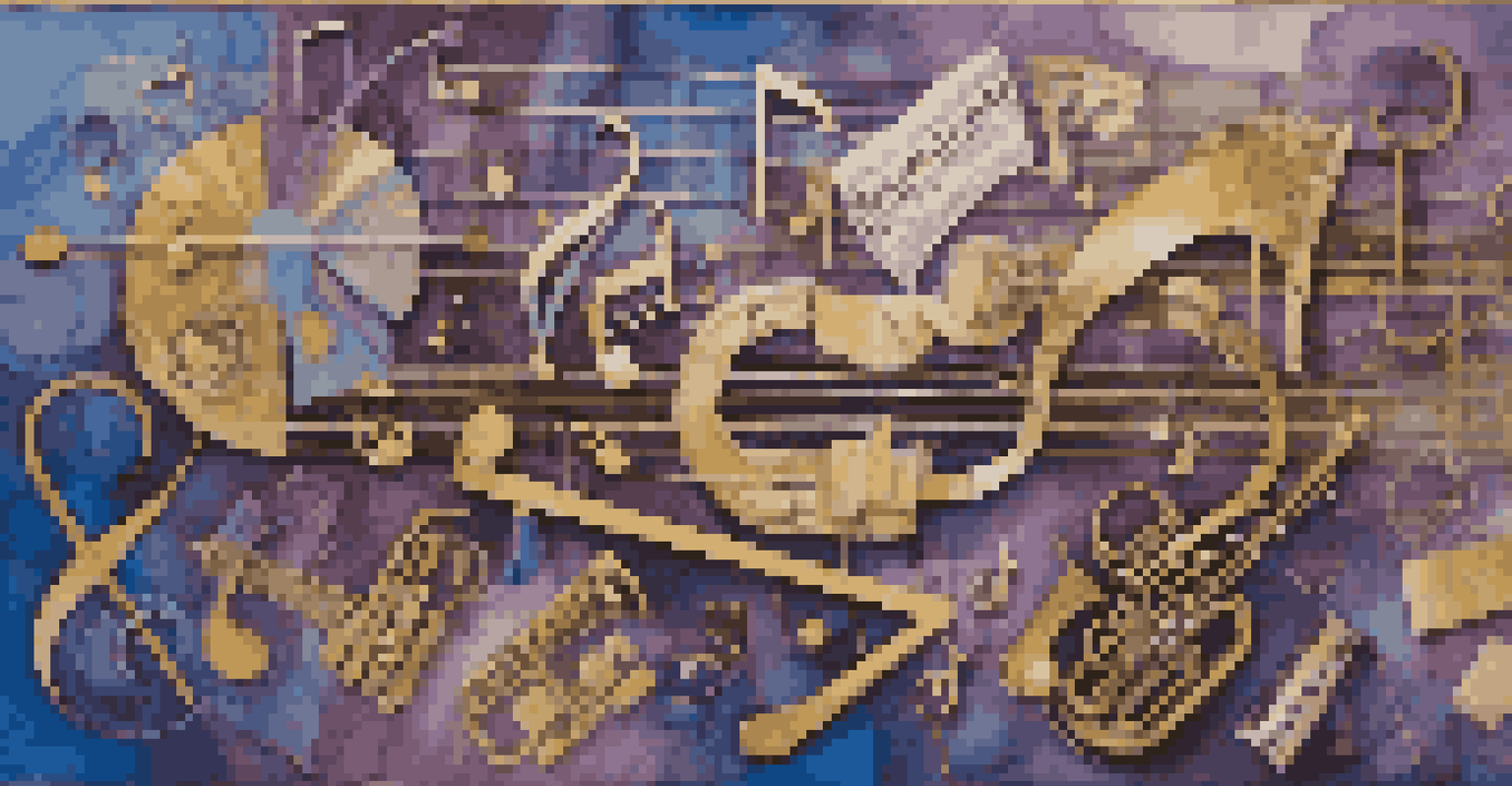Understanding the Role of Music Rights Administrators

What Are Music Rights Administrators and Their Importance?
Music rights administrators play a crucial role in the music industry by managing the rights associated with music compositions and recordings. They ensure that creators receive proper compensation for their work, which is essential for supporting artists and fostering creativity. Without these professionals, many musicians would struggle to navigate the complex landscape of music rights and royalties.
Music is the shorthand of emotion.
These administrators act as intermediaries between artists and various entities that use music, such as streaming services, radio stations, and film producers. They keep track of where music is played and ensure that the right parties are paid for its use. This not only helps artists earn a living but also encourages the continued production of new music.
In today's digital age, the role of music rights administrators has become even more vital. With the rise of online platforms and the ease of music distribution, understanding rights and royalties can be overwhelming for artists. That's where these professionals step in, providing much-needed guidance and support to navigate this intricate landscape.
Types of Music Rights Managed by Administrators
Music rights administrators handle several types of rights, including performance rights, mechanical rights, and synchronization rights. Performance rights refer to the right to publicly perform a song, whether it's at a concert or through broadcasting. Mechanical rights, on the other hand, relate to the reproduction of music, such as when a song is copied onto a CD or streamed online.

Synchronization rights come into play when music is used in visual media, like films, TV shows, or commercials. Each of these rights generates different types of revenue, and music rights administrators must be adept at managing them to ensure fair compensation for artists. Understanding these distinctions is crucial for both artists and administrators to maximize potential earnings.
Role of Music Rights Administrators
Music rights administrators manage the rights and royalties for artists, ensuring they receive fair compensation for their work.
Furthermore, the digital landscape has introduced new types of rights, like those related to streaming platforms and user-generated content. Music rights administrators must stay updated on these evolving rights to effectively advocate for artists and ensure they are compensated fairly in this rapidly changing industry.
How Music Rights Administrators Collect Royalties
One of the primary responsibilities of music rights administrators is collecting royalties on behalf of artists. This involves tracking music usage across various platforms and ensuring that all performances, broadcasts, and reproductions are accounted for. They often use sophisticated technology and databases to monitor this activity accurately.
The music business is a cruel and shallow money trench, a long plastic hallway where thieves and pimps run free, and good men die like dogs. There's also a negative side.
Once the usage data is collected, administrators calculate the owed royalties and distribute them to the respective rights holders. This process can be complex, as it requires a deep understanding of the different rights involved and the specific agreements tied to each piece of music. Transparency in this process is crucial to maintaining trust between artists and administrators.
Additionally, music rights administrators often provide artists with detailed reports about their earnings. This not only helps artists understand their revenue streams but also empowers them to make informed decisions about their careers. By demystifying the royalty collection process, these professionals play a vital role in the financial health of artists.
The Benefits of Working with a Music Rights Administrator
Collaborating with a music rights administrator offers numerous benefits for artists. First and foremost, it allows musicians to focus on their craft while leaving the complex task of rights management to experts. This peace of mind enables artists to dedicate more time to creating new music and connecting with their audience.
Moreover, music rights administrators often have extensive networks and relationships within the industry. This can lead to increased opportunities for artists, whether it's securing placements in films or negotiating better deals with streaming platforms. Their expertise can open doors that might otherwise remain closed.
Types of Rights Managed
They handle various rights, including performance, mechanical, and synchronization rights, each generating distinct revenue streams.
Another significant advantage is the potential for maximized earnings. Music rights administrators are trained to identify and capitalize on every possible revenue stream for artists. By ensuring that all rights are properly managed and royalties collected, they help artists achieve financial stability, which is essential for a sustainable music career.
Common Misconceptions About Music Rights Administrators
Despite their vital role in the music industry, there are several misconceptions about music rights administrators. One common myth is that they only deal with large, famous artists. In reality, these professionals support musicians of all sizes, from independent artists to established bands, helping them navigate the complexities of music rights.
Another misconception is that music rights administration is merely about collecting money. While collecting royalties is a significant part of the job, it also involves educating artists about their rights and providing valuable resources for career development. Administrators often serve as mentors, guiding artists through the intricacies of the music business.
Finally, some believe that hiring a music rights administrator is only necessary for those who have achieved a certain level of success. However, engaging with an administrator early on can set the groundwork for a successful career. It helps artists build a strong foundation for managing their rights from the start, which can pay off in the long run.
The Future of Music Rights Administration
As the music industry continues to evolve, so too does the role of music rights administrators. With advancements in technology and the rise of new platforms, these professionals are constantly adapting to ensure artists' rights are protected. This includes keeping up with trends like blockchain technology, which has the potential to revolutionize the way rights are tracked and royalties are paid.
Moreover, the increasing prevalence of user-generated content on platforms like TikTok and YouTube presents both challenges and opportunities for music rights administration. Administrators must navigate the complexities of these platforms to ensure artists receive fair compensation for their work. As the landscape shifts, their expertise becomes even more crucial.
Benefits of Administration Services
Working with a music rights administrator allows artists to focus on their music while benefiting from expert management and maximized earnings.
In conclusion, the future of music rights administration looks dynamic and exciting. With ongoing changes in the industry, these professionals will continue to play a key role in supporting artists and ensuring that their rights are protected. As the music world evolves, so will the strategies and tools used by music rights administrators, making their role more essential than ever.
How to Choose the Right Music Rights Administrator
Choosing the right music rights administrator can significantly impact an artist's career. First, consider the administrator's experience and reputation within the industry. Look for someone who has a track record of successfully managing rights for artists similar to you, as experience often translates to better outcomes.
Next, assess the services they offer. Not all music rights administrators provide the same level of service, so it's essential to find one that meets your specific needs. Some may specialize in certain genres or types of rights, while others offer a more comprehensive approach to rights management.

Lastly, don't underestimate the importance of communication and trust. A good administrator should be transparent, approachable, and willing to educate you about your rights. Building a strong relationship with your administrator is key to navigating the complexities of music rights effectively and ensuring your needs are met.